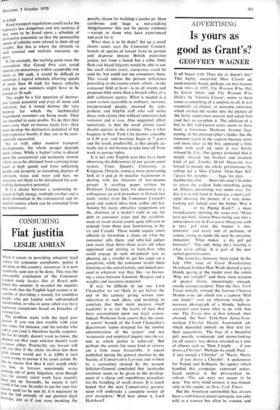CONSUMING
Fiat justitia
LESLIE ADRIAN
When it comes to providing adequate legal redress for consumer complaints, justice is not done in this country; moreover, it is now manifestly seen not to be done. This was the inescapable conclusion of the Consumer Council study Justice Out of Reach pub- lished this summer. It revealed the unpalat- able truth that the English legal system is in- capable of providing a remedy for countless People who get landed with sub-standard merchandise, or who in some other way have legitimate complaints based on breaches of existing law.
The problem starts with the legal pro- fession. If you nut into trouble with your new radio, for instance, and the retailer who sold it you (and is therefore legally responsi- ble for it) simply doesn't want to know, the chances are that your solicitor doesn't want to know either. Practically any lawyer will tell you that if the claim involves less than £100 (many would put it at £200) it isn't Worth trying to pursue it by court action. By this he means first that it isn't worth while for him, as lawyers notoriously make nothing out of petty litigation, even though fees for county court work have recently been put U. Secondly, he means it isn't Worth it for you. In order to sue for your few measly quid (as he sees it), it is necessary to don the full panoply of our glorious legal heritage, just as if you were invoking the
penalty clause for building a jumbo jet. How cumbrous and huge a nut-cracking sledgehammer this can be passes credence —except to those who have experienced and paid for it.
What then is to be done? Set up a small claims court, says the Consumer Council, banish all species of lawyer from its portals and dispense instant British palm-tree justice, not from a bench but a table. Only flesh and blood litigants would be able to use the small claims court; companies could be sued by, but could not sue consumers there.
This would redress the present imbalance prevailing in the county court, which—in the consumer field at least—is to all intents and purposes little more than a branch office of a deb) collection agency. What is needed is a court system accessible to ordinary, nervous, inexperienced people, manned by sym- pathetic and helpful staff who will make those with claims (but without solicitors) feel welcome and at ease. Also suggested, albeit tentatively, is that the small claims court should operate in the evenings. This is what happens in New York City (parties assemble at 6.30 p.m and hearings begin at 7 p.m.) and the result, predictably, is that people ac- tually use it, not having to take time off from work to pursue rights.
_ It is not only English eyes that have been observing the deficiencies of our quaint court system. From Queen's University at Kingston. Ontario, comes a more penetrating look at it and at its peculiar weaknesses in dealing with the interests of low-income groups. A startling paper written by Professor Terence Ison, for discussion at a colloquium on civil procedure at Oxford last week, makes even the Consumer Council's good and radical ideas look rather old hat. Among his many attractive suggestions are the abolition of a trader's right to sue for debt in consumer cases and the establish- ment of small claims courts quite different in concept from those now functioning in the us and Canada. These would require court officials to formulate a claim on what the consumer tells them, and whiz-kid judges (not more than thirty-three years old when appointed and retiring at forty-five) who could engage in such un-judicial acts as phoning up a retailer to get his angle on a complaint, while the consumer stands there listening to the conversation, and indeed pro- ceed in whatever way they like—so becom- ing a cross between Solomon. Maigret and a weights and measures inspector.
It may be difficult to see any Lord Chancellor we are likely to get before the end of the century giving serious con- sideration to such ideas, and tempting to conclude that their main purpose (itself laudable) is to stir the layers of dust that have accumulated upon our legal system. Indeed. Professor Ison asserts that the coun- ty courts' branch of the Lord Chancellor's department 'seems designed for the routine administration of the system' and not 'systematic and empirical inquiry into the ex- tent to which justice is achieved'. But perhaps the omens for some kind of reform are a little more favourable. A report published during the general election by the Society of Conservative Lawyers and written by a committee chaired by the present Solicitor-General concluded that 'particular attention needs to be given to the develop- ment of a cheap and expeditious procedure for the handling of small claims. It is much hoped that the next Conservative govern- ment will undertake a complete review of civil procedure.' Well how about it, Lord Hailsham?






































 Previous page
Previous page